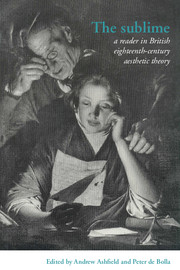Book contents
- Frontmatter
- Contents
- List of Abbreviations
- Introduction
- Part I The Longinian tradition
- Part II Rhapsody to rhetoric
- Part III Irish Perspectives
- Part IV The Aberdonian Enlightenment
- Part V Edinburgh and Glasgow
- Part VI From the Picturesque to the Political
- 41 A dissertation on oriental gardening (1772)
- 42 An essay on the picturesque (1794)
- 43 A review of The landscape (1795)
- 44 The history of the life of William Pitt, Earl of Chatham (1783)
- 45 Enquiry concerning political justice (1798)
- 46 Reflections on the revolution in France (1790)
- 47 A letter from the right honourable Edmund Burke to a noble lord (1796)
- 48 A vindication of the rights of man (1790)
- 49 Letters written in France (1790)
- 50 A tour in Switzerland (1798)
- Sources and further reading
41 - A dissertation on oriental gardening (1772)
Published online by Cambridge University Press: 05 June 2012
- Frontmatter
- Contents
- List of Abbreviations
- Introduction
- Part I The Longinian tradition
- Part II Rhapsody to rhetoric
- Part III Irish Perspectives
- Part IV The Aberdonian Enlightenment
- Part V Edinburgh and Glasgow
- Part VI From the Picturesque to the Political
- 41 A dissertation on oriental gardening (1772)
- 42 An essay on the picturesque (1794)
- 43 A review of The landscape (1795)
- 44 The history of the life of William Pitt, Earl of Chatham (1783)
- 45 Enquiry concerning political justice (1798)
- 46 Reflections on the revolution in France (1790)
- 47 A letter from the right honourable Edmund Burke to a noble lord (1796)
- 48 A vindication of the rights of man (1790)
- 49 Letters written in France (1790)
- 50 A tour in Switzerland (1798)
- Sources and further reading
Summary
The scenes which I have hitherto described, are chiefly of the pleasing kind: but the Chinese Gardeners have many sorts, which they employ as circumstances vary; all which they range in three separate classes; and distinguish them by the appellations of the pleasing, the terrible, and the surprising.
The first of these are composed of the gayest and most perfect productions of the vegetable world; intermixed with rivers, lakes, cascades, fountains, and water-works of all sorts: being combined and disposed in all the picturesque forms that art or nature can suggest. Buildings, sculptures, and paintings are added, to give splendour and variety to these compositions; and the rarest productions of the animal creation are collected; to enliven them: nothing is forgot that can either exhilarate the mind, gratify the senses, or give a spur to the imagination.
Their scenes of terror are composed of gloomy woods, deep valleys inaccessible to the sun, impending barren rocks, dark caverns, and impetuous cataracts rushing down the mountains from all parts. The trees are ill formed, forced out of their natural directions, and seemingly torn to pieces by the violence of tempests: some are thrown down, and intercept the course of the torrents; others look as if blasted and shattered by the power of lightning: the buildings are in ruins; or half consumed by fire, or swept away by the fury of the waters: nothing remaining entire but a few miserable huts dispersed in the mountains, which serve at once to indicate the existence and wretchedness of the inhabitants.
- Type
- Chapter
- Information
- The SublimeA Reader in British Eighteenth-Century Aesthetic Theory, pp. 268 - 270Publisher: Cambridge University PressPrint publication year: 1996



